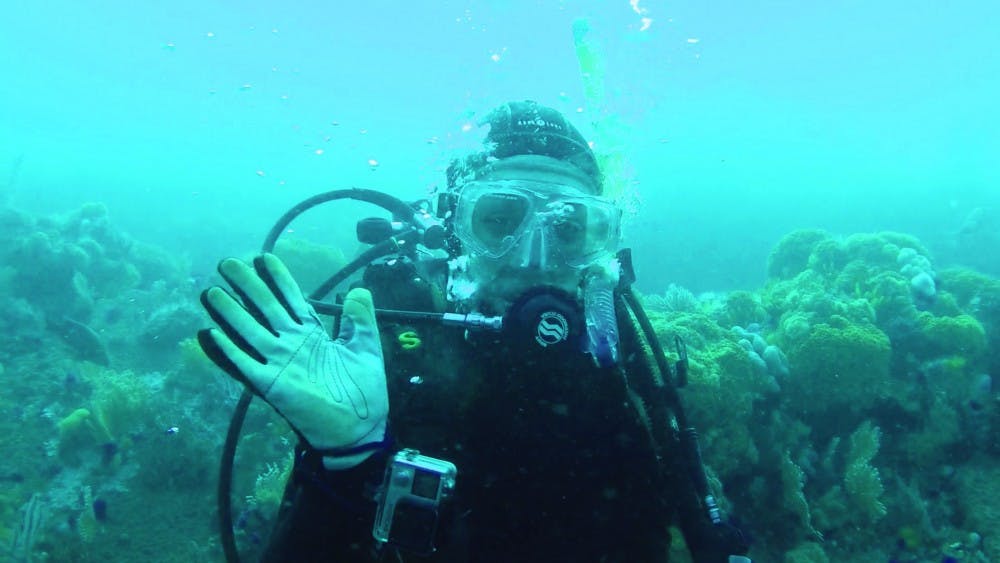Editor's note: Intern Spotlight is a Ball State Daily News series profiling Ball State students and their summer internships. If you have any suggestions as to who we should feature next, send an email to features@bsudailynews.com.
“I’ve never been more terrified in my life.”
That’s how senior zoology major Autum Auxier felt standing on Bloukrans Bridge in Mossel Bay, South Africa, hooked to a bungee cord, ready to fall 708 feet toward the river below.
“I even cried, but if there’s one thing I can say from this, it is always take the jump,” Auxier said. “I cannot begin to explain how applicable this is to daily life. Plus, the pictures of me crying before I jumped are quite hilarious now.”
Auxier took her first jump this summer when she left the U.S. for an internship at the Marine Hope Conservancy in South Africa, where she had the opportunity to work with a diverse group of wildlife including orcas, African penguins, Cape fur seals and great white sharks.
“The reefs [in South Africa] are still very healthy with vibrant colors and many creatures calling them home,” Auxier said. “As a marine biologist and scuba diver, [South Africa] is the place to be.”
In South Africa, Auxier said she spent most of her time in Algoa Bay, where she said the differences between American and South African culture stuck out to her “like a sore thumb.”
“They drive on the left side of the road, all their cars are manual [and] they call streetlights robots,” Auxier said. “But then, it all became normal … By the end of the month, I was so accustomed to their way of life and everything around me.”
With her internship, Auxier worked on several projects alongside researchers to study how plastic pollution affects marine life. One of Auxier’s projects was analyzing high-resolution photographs of water samples to understand the number of zooplankton and phytoplankton in a given sample.
Auxier said the samples and data she accumulated will be taken to a London laboratory to be further analyzed for the amount of plastic in the guts of zooplankton and phytoplankton.
“This project will later include tissue, muscle and gut analysis of sardines and sharks to analyze how much plastic is traveling up the food chain,” Auxier said. “Sharks are utilized in this study because they are very similar to humans in terms of their place in the food chain, so understanding how much plastic is entering their systems from their food can give us a better understand of how much plastic is entering our systems from the food we eat.”
Auxier also conducted a nearly 15-day beach clean-up. Collecting trash found in the depths of the bay’s sandy beaches, she catalogued what items she found and the items’ sizes.
She said one of her biggest challenges during her internship was teaching school children in South Africa about plastic pollution and its effects on marine and human life. She said although kids were not her forte, she enjoyed seeing how interested they were.
“I spend my life communicating my research to experts in the field, so I know how to talk to them, but not kids,” Auxier said. “However, after some time, I found it quite relieving to see that kids were excited to learn about why the bay is important, and I think I will have to find a way to incorporate teaching kids here in the U.S.”
Not only does Auxier want to teach children in the future, she said she also wants to inform her family, friends and peers about the importance of making conscious, eco-friendly decisions, such as using reusable cups, straws and bags instead of plastic.
“[Biodegradable plastics are] all pretty much a marketing scam to make people think they are doing something good,” Auxier said. “All single-use plastics are bad, whether they say biodegradable or not. Everything degrades over time, but that time can be hundreds or thousands of years.”
In addition to her research and projects, Auxier had the chance to visit Woody Cape, where she and her group rescued a juvenile penguin and collected washed-up paper nautilus shells. She also took a three-day trip to Mossel Bay, where she went cage-diving with great white sharks.
Before Auxier left for South Africa, Jess Ward, assistant professor of biology, said she recognized Auxier’s passion for marine biology while Auxier was her research assistant.
“When I was searching for a research assistant, Autum impressed me with her honest and sincere desire to understand animal behavior,” Ward said. “I recall being particularly struck during a conversation by [Auxier’s] questions that revealed an underlying interest in the mechanisms, [both] genetic and environmental, that control variation in behavior and alter behavioral outcomes — not simply an interest in animal husbandry or domestic animal health.”
Now that Auxier has returned, Ward said she is excited to see what Auxier contributes during her time as an Honors College Fellow.
“Studying abroad, and travel in general, widens a person’s perspective and helps him or her discover what they are truly passionate about,” Ward said. “A student just embarking on their career should engage in a wide range of experiences like Autum has done – both to find their fit in the world and to benefit from new ways of thinking.”
Since completing her internship, Auxier said her time in South Africa has done just that – helped her solidify her plan to become a marine biologist.
“Everyone has something to teach you — all you have to do is listen,” Auxier said. “I learned something new from every single person I met [in South Africa], whether they were a skipper on the boat or my Uber driver. Everyone there had something to tell me about the bay, about the water [and] about the animals.”
Contact Kamryn Tomlinson with comments at kptomlinson@bsu.edu.





